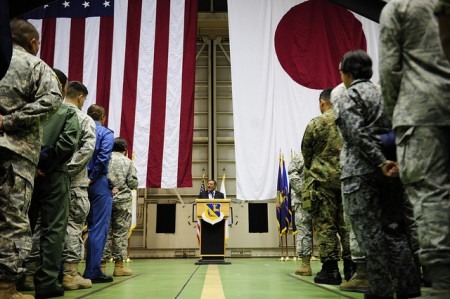
The Japanese government welcomes the recently released US defense strategy because it rebalances the strategic focus toward the Asia-Pacific region. But the other focus of this new strategy — the so-called anti-access, area denial (A2/AD) capabilities of China which, the United States fears, could jeopardize its forward presence and freedom of action in the Western Pacific — does not get as much attention from Japan.
The new defense strategic guidance, “Sustaining U.S. Global Leadership: Priorities for 21st Century Defense,” has quickly gained currency in policy discussions in Japan after it was rolled out Jan. 5. Defense Minister Tanaka Naoki has said in the Diet that Tokyo welcomed it. He explained, for example, Jan. 31: “I understand that it indicates the United States attaches more importance to the Asia-Pacific region and enhances its regional presence. I believe it will be a significant contribution to the peace and security in this region.”

